Michigan lost these notable figures in 2022
Michigan lost philanthropists, judges, civil rights advocates, sports figures, Motown artists and community organizers in 2022.
A 100-year-old Tuskegee Airman, Miss America 1970, an astronaut from the Apollo 9 mission, groundbreaking LGBTQ activists, the man who created the Farmer Jack grocery chain and other founders of iconic businesses in the Detroit area, Mackinac Island and Frankenmuth were among those Michigan said goodbye to this year.
Here are some of the most notable Michigan figures who died in 2022:

Retired Lt. Col. Alexander Jefferson, a member of the Tuskegee Airmen, World War II prisoner of war and lifelong Detroiter, died June 22 at 100 years old.
The Tuskegee Airmen were the nation’s first African American military pilots, and Jefferson was among the first to escort bombers in WWII.
He served in World War II as a P-51 fighter pilot with the 332nd Fighter Group-301st Fighter Squadron in Ramitelli, Italy, later called the “Red Tails.” Jefferson flew 18 missions before being shot down and held as a prisoner in Poland for eight months in 1944-45.
He was honorably discharged from active duty in 1947 and retired from the reserves in 1969 with the rank of lieutenant colonel. After the war, Jefferson was a U.S. Postal Service mail carrier, then became a Detroit public schools science teacher. He retired as an assistant principal in 1979.
In retirement, Jefferson spent time inspiring youth and sharing stories about the Tuskegee Airmen.
The Congressional Gold Medal was presented to Jefferson and the Tuskegee Airmen in 2007 by President George W. Bush.

Mamie King-Chalmers, a longtime Detroiter and steadfast civil rights advocate, died Nov. 29 at 81. She is one of three people captured in a famous Life magazine photo getting blasted by a firehose in Birmingham in 1963, a snapshot of her life’s legacy.
King-Chalmers caught the attention of Theophilus Eugene “Bull” Connor, a strict segregationist who served as Birmingham’s commissioner of public safety, due to her last name making him suspect that she was related to Martin Luther King, which she was not.
On that fateful day on May 17, 1963, King-Chalmers was protesting at a park with her siblings and friends, prompting police intervention. When Connor spotted her, he sent dogs to chase her and she ran for cover in front of a locked doctor’s office where Connor ordered the fire department to blast water at her.
The courage of King-Chalmers and her peers catapulted the Civil Rights Movement into the national spotlight and changed the course of history in the United States.
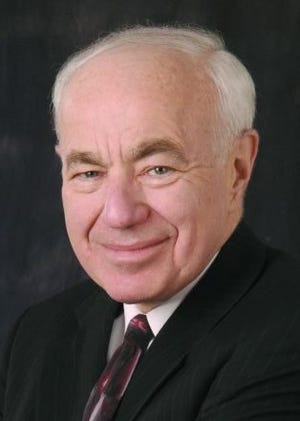
Eugene Driker, a prominent attorney known for dedicating time and financial support to cultural organizations, serving as a civic leader who helped mediate Detroit’s bankruptcy and being a proud and impactful alum of Wayne State University, died Sept. 29 at 85 years old.
Driker was selected as one of the mediators in the city’s 2013 bankruptcy case. That mediation team successfully negotiated the resolution of the largest municipal bankruptcy in history. Driker played a key role in what became known as the “Grand Bargain,” a deal that prevented the Detroit Institute of Arts collection from being sold off and mitigated cuts to city pensions by gathering $816 million in state and foundation funding.

Gilbert Hudson, former CEO of the Hudson-Webber Foundation, died Feb. 24 at 87 years old.
Known to many as Gil, Hudson descended from a line of philanthropists. His grandfather’s brother was J.L. Hudson, the self-made founder of the J.L. Hudson Company, who started many Detroit-based initiatives and donated substantial funds to different causes.
In 1973, Hudson led three family foundations, which merged in 1984 to become the Hudson-Webber Foundation, a private, independent grantmaking organization created to support organizations and institutions that help move the city of Detroit forward. Hudson led the foundation until his retirement in 1999 and continued his service as chair of the board until 2005, and as a trustee until his death.
Judge Adam Shakoor, former Detroit deputy mayor, civil rights advocate and attorney who represented Rosa Parks, died March 20 at the age of 74.
Civil rights groups say Shakoor was the nation’s first-ever Muslim judge.
He became an attorney and was appointed judge of the Common Pleas Court for Wayne County by the late Gov. William Milliken in 1981.
Shakoor retired from the bench in 1989 to take on duties as the deputy mayor of Detroit under Mayor Coleman A. Young. He served in that position until 1993. He served as the personal attorney of civil rights icon Rosa Parks from 1995 until her passing in 2005.

Anne Parsons, who led the Detroit Symphony Orchestra for more than 17 years, expanding its reach and championing programs that focused on local students and neighborhoods, died March 28 at 64 years old.
Before retiring, Parsons was the longest-serving executive leader in the DSO’s modern era, and prior to coming to Detroit was general manager of the New York City Ballet.
From late 2018 until she retired in December 2021, Parsons led the DSO as president and CEO while undergoing treatment for lung cancer. She helped guide the DSO to fiscal stability, along with global acclaim for a series of pioneering digital initiatives after taking the reins in 2004.
During Parsons’ tenure, the DSO reached Detroiters and DSO fans across the region with chamber music programs, senior engagement concerts, music therapy partnerships, in-school appearances and full orchestra performances through the DTE Energy Foundation Community Concerts and the William Davidson Neighborhood Concert Series.
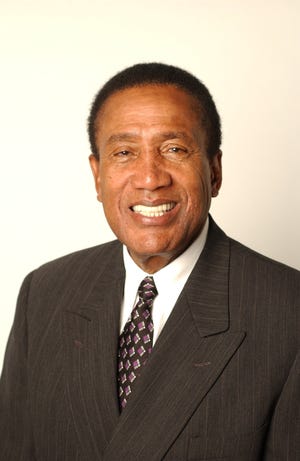
William Lucas — an FBI agent, Wayne County sheriff, the first Wayne County Executive and a former Democrat who became a Republican Party nominee for Michigan’s governor — died May 30. He was 94.
After working as a teacher and welfare case worker in New York City, he joined the New York Police Department, where he worked for nine years, often undercover, later meeting Robert Kennedy, then U.S. attorney general, who offered him a job in the Justice Department. Lucas became a civil rights division investigator — and then joined the FBI, which sent him to Cincinnati and then Detroit.
In Detroit, he joined the Wayne County Sheriff’s Office as undersheriff, and two years later was appointed Wayne County sheriff. In 1970, he was elected Wayne County sheriff, and reelected twice more. In 1982, he was elected to the newly created office of Wayne County executive.
Three years later, he switched his party affiliation, which made national news, and in 1986, won Michigan’s Republican gubernatorial primary. He beat millionaire businessman Dick Chrysler, the front-runner until the closing days of the campaign.

James A. McDivitt, who commanded the Apollo 9 mission testing the first complete set of equipment to go to the moon, died Oct. 13. He was 93.
McDivitt was also commander of 1965’s Gemini 4 mission, where his best friend and colleague Ed White made the first U.S. spacewalk. His photographs of White during the spacewalk became iconic images.
McDivitt grew up in Kalamazoo, Michigan. He worked for a year before going to junior college. When he joined the Air Force at 20, soon after the Korean War broke out. He had never been on an airplane. He was accepted for pilot training before he had ever been off the ground.
He flew 145 combat missions in Korea and came back to Michigan where he graduated from the University of Michigan with an aeronautical engineering degree. He later was one of the elite test pilots at Edwards Air Force Base and became the first student in the Air Force’s Aerospace Research Pilot School.
In 1962, NASA chose McDivitt to be part of its second class of astronauts, often called the “New Nine,” joining Neil Armstrong, Frank Borman, Jim Lovell and others.

Dennis Miller, a longtime co-owner of Dearborn’s iconic Miller’s Bar, beloved by burger fans in metro Detroit and beyond, died Nov. 10 at 74.
In business since 1941, Miller’s is known for its famous no-frills signature juicy ground round burgers have received accolades locally and nationally. Miller’s uncle first opened the bar in 1941. His dad, Russell Miller, “made it what it is,” Miller said in 2008.
Miller started working there doing “porter work — janitorial stuff — in the ninth grade and was bartending in 12th grade,” he told the Free Press. He and his brother then took over running the family burger bar, a well-known spot for Ford workers and families with their kids.
Rosetta Hines-Loving

Beloved Detroit radio personality Rosetta Hines-Loving, who brought jazz to the region for decades, died Feb. 14 at 82.
Hines, who once told the Free Press, “I hate the term ‘disc jockey’” and preferred to be called a “music communicator,” was born in Chattanooga, Tennessee, but graduated from Detroit’s Eastern High School and started out in radio as an engineer at WGPR (107.5 FM).
The first Black woman in Michigan to earn a broadcast engineering degree, Hines-Loving had jazz shows on WDET (101.9 FM) and WJLB (97.9 FM) in the 1980s but was most closely associated with her work at WJZZ (105.9 FM), where she had a long-running program in the 1970s and served as music director in the 1990s.
Charles Alexander

Charles Robert Alexander, a revered artist, community activist and longtime columnist for LGBT publications Pride Source and Between the Lines, died at 86 on Dec. 10 after a bout with pneumonia.
Born in raised in Detroit, Alexander was a 1956 graduate of Cass Technical High School, where he majored in commercial arts. He went on to graduate from Wayne University with a bachelor’s degree. He came out as gay in 1959, rare at the time, and spent 28 years working as an instructor and administrator for Detroit Public Schools.
He would become renowned for his mixed media artwork and exhibited his work in Detroit, Chicago and San Francisco, and also worked as an artist instructor at the Detroit Institute of Arts.
John Eddings, who served as ombudsman for the city of Detroit, known for his listening ear and trying to find solutions for people who had been treated unfairly, died April 8 at 79 in Las Vegas.
Eddings worked in various executive positions before serving a 10-year appointment as Detroit ombudsman under three mayors: Coleman A. Young, Dennis Archer and Kwame Kilpatrick. After retiring from Detroit, Eddings became Macomb County’s first ombudsman and worked there for about a year. He was the first Black president of the United States Ombudsman Association.

Irene Bronner, who helped build one of Michigan’s most iconic retail attractions, Bronner’s Christmas Wonderland in Frankenmuth, died Oct. 16. She was 95.
Born in Hemlock, Michigan, Bronner was married for more than 55 years to Wallace “Wally” Bronner, who died in 2008 at 81.
Irene Bronner helped her husband develop the sprawling, year-round, Yuletide-themed store in the Saginaw County city of Frankenmuth, known as “Michigan’s Little Bavaria.” She served on the board of directors and in many other roles at the company touted as the largest Christmas-themed store in the world.
Judy Zehnder Keller, a prominent Frankenmuth businesswoman who founded the Bavarian Inn Lodge, died Oct. 19. She was 77.
A Frankenmuth native, Zehnder Keller started working at the Bavarian Inn Restaurant in 1960 with her parents. She founded and built the Bavarian Inn Lodge resort in 1986, leading it through six expansions. The resort is known as a destination for lodging, dining, shopping, events, a conference center and its indoor waterpark.
She also owned the Frankenmuth Cheese Haus, which expanded in 2018 to a new location on Main Street. Over her career, Zehnder Keller helped develop and manage several family businesses in the community, including the Schnitzelbank Shop, Covered Bridge Shop, Frank’s Muth and retail stores within Frankenmuth River Place Shops.

Victor Andre Callewaert Jr., owner and iconic figure of several Mackinac Island family businesses, died May 8 at his home in Grosse Pointe Shores. He was 85.
In 1960, Callewaert and Harry Ryba, Callewaert’s father-in-law who owned a doughnut shop when he was younger, opened their first fudge operation in a storefront on Mackinac Island. Several years later, in 1965, the pair bought the Lake View Hotel.
The Callewaert family’s Mackinac Island businesses have grown since that first fudge shop opened. More than a half-dozen businesses are operated by the Callewaerts, including the historic Island House Hotel, 1852 Grill Room, Ice House BBQ, Ryba’s Fudge Shops, Mary’s Bistro Draught House, Pancake House, Pine Cottage Bed & Breakfast, Seabiscuit Café and a Starbucks.

Charles Alexander Forbes, a driving force for protecting and preserving Detroit’s unique architectural profile, died Sept. 29. He was 92.
Forbes was born to Scottish immigrants in Highland Park and attended Detroit Public Schools. He graduated as class president in 1948 from Henry Ford Trade School and, after two years of military service, attended Wayne State University, earning a bachelor’s degree in business while working at Ford Motor Co.
The Bloomfield Hills resident, known as Chuck to many, retired from the company at age 51 to continue his work in partnership syndications and to launch a third career devoted to preserving Detroit’s historic theater district. He was president of Forbes Management. The entrepreneur and developer assembled more than 40 properties for renovation and saw placement of seven facilities on the National Register of Historic Places.
The Fox, State and Gem theaters are among the architectural treasures Forbes helped save. When the site of the Gem, the Century Club building and Elwood restaurant was slated for stadium development, Forbes dedicated his efforts and resources to save these historic structures through relocation rather than demolition.

Paul Borman, former president and chairman of Farmer Jack supermarkets, died in Boca Raton, Florida on May 3. He was 89.
A native Detroiter, Borman graduated from Michigan State University in 1953 and served in the U.S. Army until 1956. After that, he worked with his father at Borman Foods, becoming president of the company in 1962, giving the Borman food markets a new name — Farmer Jack. The brand grew exponentially under his leadership to become one of the largest food suppliers in the state.
The company had more than 100 stores and 7,500 employees by 1980. The company was sold to The Great Atlantic & Pacific Tea Company, known as A&P in 1989. Borman retired, and Farmer Jack supermarkets slowly dwindled, until the last one closed its doors in 2007.
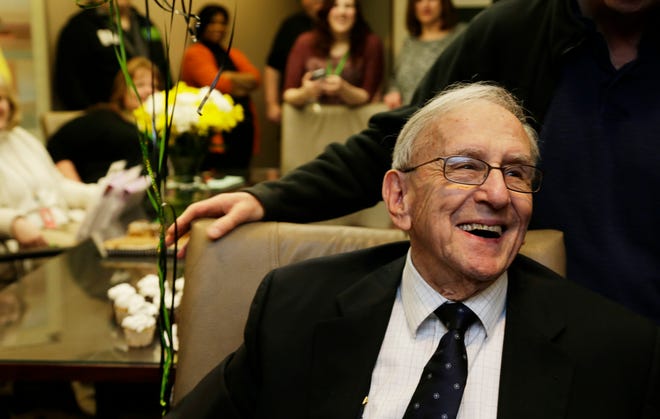
Specs Howard, the radio DJ who founded the Specs Howard School of Media Arts in metro Detroit more than 50 years ago, died Sept. 3 at 96.
The school was a starting point for numerous radio and TV careers in the Motor City marketplace and across the country.
Among the many Specs Howard alums who went on to become Detroit media stars are local TV news anchors Glenda Lewis (WXYZ-TV, 7 Action News) and Amy Andrews (WJBK-TV, Fox 2 Detroit) and Detroit radio icons like Ken Calvert and Doug Podell.

Pamela Anne Eldred-Robbins, who grew up in northwest Detroit and West Bloomfield, who was crowned Miss America in 1970, died July 12 at 74.
Eldred-Robbins, was the third Miss Michigan to win the title of Miss America since the pageant’s creation in 1921.
During her reign, Eldred-Robbins twice visited U.S. troops in Vietnam on USO tours and was awarded citations for courage when enemy fire disrupted a show. She was known for breakthrough advocacy for people with developmental disabilities, in recognition of a younger sister’s lifelong struggle.
Eldred-Robbins became a national spokesperson for the March of Dimes. After her sister died in 2008, Eldred-Robbins and her family funded through the Miss Michigan Organization an annual $2,000 scholarship to a pageant contestant pursuing a career that impacts the disabled community.
Joe Messina, a jazz guitarist whose work with the Funk Brothers helped build the bedrock of the Motown sound, died April 4 in Northville. He was 93.
With the Funk Brothers from the late ’50s through the early ‘70s, Messina played on a staggering array of hits, part of a guitar attack alongside regulars Robert White and Eddie Willis inside Motown’s Studio A.
Typically using a Fender Telecaster with a modified neck, Messina lent a brightness to the guitar-stamped backbeat of the iconic Motown sound — a skilled sight reader with a lithe, funky touch. His performances with the Funk Brothers graced hits by the Supremes, Four Tops, the Temptations, Stevie Wonder, Marvin Gaye and myriad others.

Detroit native Lamont Dozier, part of Motown’s mighty Holland-Dozier-Holland songwriting-production team, died Aug. 8 at 81.
Though he spent most of his career behind the scenes, Dozier was showered in industry accolades, inducted into the Rock & Roll Hall of Fame, the Songwriters Hall of Fame and the Hollywood Walk of Fame.
Dozier was a melody man and song polisher, working with Brian Holland on the music and production side as Eddie Holland finessed the lyrics. He regarded himself as the bridge between music and words, and he credited that division of labor as the key to the threesome’s hit formula.

Al Porada, founder of Donutville USA, a Dearborn mainstay for doughnuts, coffee and a range of beverages for more than 40 years, died Dec. 8 age 91.
Porada began building the Donutville USA empire with its first location on Ford Road in 1966. Having served in the U.S. Coast Guard during the Korean War, the doughnut shop’s Independence Day opening was a nod to Porada’s patriotism.
Over the decades, Donutville USA expanded, with two additional locations in metro Detroit. The chain became a go-to destination for glazed bowties and cinnamon rolls, Bavarian cream doughnuts and, during one of the most exciting times of year for a bakery — paczki.

Lena Meijer, philanthropist and wife of the late grocery chain co-founder Frederik Meijer, died Jan. 15. She was 102.
The daughter of German immigrants, Lena Meijer was born in 1919 and raised on her family’s farm near Lakeview, Michigan.
When she moved to Greenville, Michigan, in 1940, she was hired as a cashier at the original Meijer supermarket, where she met Frederik Meijer. The two married and moved to Grand Rapids, where she supported the growth of her husband’s grocery business.

The iconic “La Dee Da” polka musician Marshall Lackowski, better known by his stage name Big Daddy, died April 9. He was 85.
Before the name Big Daddy was the name for polka music in Michigan and beyond, Lackowski of Parisville in Huron County began his music career in the 1950s with his brothers William and Clarence in the Lackowski Brothers Orchestra playing gigs in the Thumb region.
The trio eventually disbanded, but Big Daddy kept going, forming the La Dee Das and passing the musical calling on to his sons. Across the decades, three things never changed for Big Daddy: His accordion stayed against his chest, his love for polka music never strayed and family remained at the core.
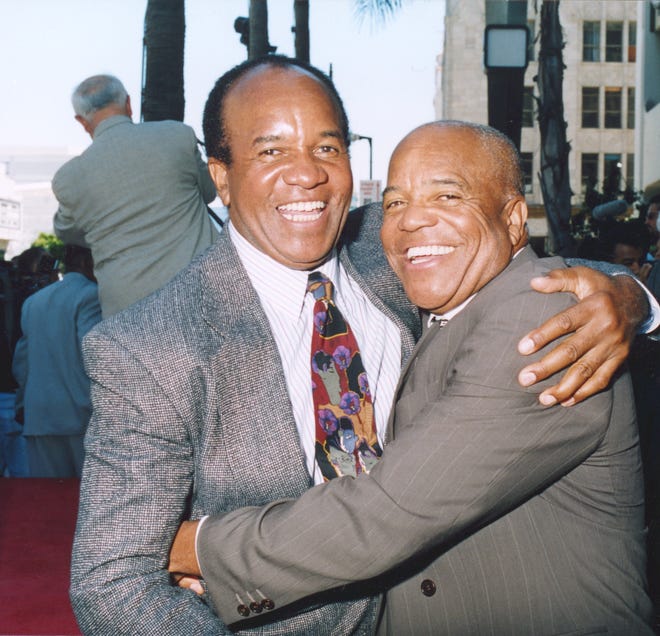
Recording artist, songwriter and music executive Robert Louis Gordy Sr., the youngest brother of Motown founder Berry Gordy, died Oct. 21 at his home in Marina del Rey, California. He was 91.
He started his music career under the pseudonym Bob Kayli, releasing a song in 1958 called “Everyone Was There,” written with Berry Gordy.
He contributed to various hits while at Motown, landed his first acting role as a drug pusher for the movie “Lady Sings The Blues” in 1972, and eventually took over Jobete Music Publishing, the release stated.
U.S. District Judge Avern Cohn, an icon in the Detroit federal courthouse, who, as a young lawyer, represented looters in the 1967 uprising for free, dreamed for years of becoming a federal judge and went on to fulfill that goal with passion, compassion, integrity and grit, died Feb. 4. He was 97.
He was a Detroit native who served on the federal bench for 40 years and oversaw cases until he was 95.
After a decades-long career practicing administrative law and working as a cooperating attorney for the American Civil Liberties Union, Cohn was nominated to the federal bench in 1979 by President Jimmy Carter. Cohn was the oldest serving judge in Michigan at the time of his retirement in 2019.

Jim Toy, a famed LGBTQ activist thought to be the first openly gay man in Michigan, died Jan. 1 at age 91.
The longtime Ann Arbor man rose to recognition after publicly coming out at an anti-Vietnam War rally in 1970.
Toy then took his activism to a new level. He co-founded the University of Michigan’s Human Sexuality Office, which has since become the Spectrum Center. It was the first-ever staffed office at a university dedicated to sexual orientation. He also lobbied the university to include sexual orientation in its bylaws on non-discrimination.
Ann Arbor previously has proclaimed April 29 as Jim Toy Day and the Jim Toy Community Center, a resource center for the LGBTQ community in Washtenaw County, is named after him.

Moeller, the former Michigan football coach who later served as interim coach with the Detroit Lions, died July 11 at the age of 81.
Moeller was a longtime assistant coach under Bo Schembechler and replaced the legendary coach in 1990 upon Schembechler’s retirement.
In five seasons at U-M, Moeller was 44-13-3 and won three Big Ten championship and the 1993 Rose Bowl over Washington. Moeller’s teams finished in the top 20 in the national polls each of his five seasons.

John Szeles, known in the entertainment world as The Amazing Johnathan, a Las Vegas-based comic-magician with metro Detroit roots, died Feb. 22 at 63 years old.
Born John Edward Szeles in Detroit, Johnathan grew up in Fraser before eventually ending up in Las Vegas.
A well-known prankster and a skilled illusionist, Szeles was briefly suspected of faking his terminal illness, as documented in the 2019 film “The Amazing Johnathan Documentary.” In 2014, Szeles revealed at a show in Las Vegas that he had been diagnosed with severe cardiomyopathy and that he had one year to live. Many in the audience thought it was a joke.
The film documented his return to the stage after surviving longer than doctors expected. It became clear during the course of filming that he was indeed severely ill.

Chris Jaszczak, a music, art and theater promoter who was long involved in Detroit’s arts scene, died March 29 after a battle with cancer. He was 74.
After serving two tours of duty in Vietnam, Jaszczak attended Wayne State University and later partnered with friends to open Eastown Theatre on Harper Avenue. He then partnered with members of an architectural group to buy 1515 Broadway in downtown Detroit. The venue offered plays and included a café.

Art “Pinky” Deras, an iconic Little League pitcher who took Hamtramck to the Little League World Series championship in 1959 died June 5 at 75 years old. The Little League World Series championship was the state’s only championship win until Taylor North won in 2021.
Deras was drafted by the St. Louis Cardinals and played in the minor leagues. After that, he joined the National Guard. When he came home, he lived in Sterling Heights and worked for the Warren Police Department for 29 years.
Deras was inducted into the National Polish-American Sports Hall of Fame in 2011.

Janice Bluestein Longone, who is credited with collecting thousands of items chronicling the culinary history of the United States, including cookbooks, menus, advertisements and diaries, died Aug. 3 at age 89.
Longone’s collection formed the Janice Bluestein Longone Culinary Archive at the University of Michigan in Ann Arbor, where her husband, Daniel T. Longone, was a chemistry professor.
Longone said she believed the collection showed how American agriculture and culinary practices defined regional customs and traditions. In 2018, Longone was honored for her lifelong commitment to culinary history by the Association of Food Journalists.

WWJ overnight anchor Jim Matthews died Sept. 23. He was 57.
Joe Nicolai, Matthew’s brother, said his brother had a passion for radio and was smooth, professional, never missed a beat and knew how to make calls and write stories efficiently. He said Matthews loved radio and listened to WWJ while growing up. When Matthews worked at WWJ, “he kind of was living his dream,” Nicolai said.
Matthew grew up on Detroit’s east side and went to Lutheran High School East in Harper Woods.
Tom Weiskopf, golf major champion and architect of one of Michigan’s most revered golf courses, died Aug. 20 at 79.
Weiskopf won 16 PGA Tour titles, including the 1973 British Open at Royal Troon.
He experienced all corners of the game, from his time as a PGA Tour player to broadcast work as a golf commentator to his status as an accomplished course designer. Weiskopf created courses all over the world, and was named Golf Course Architect of the Year in 1996.

Former Detroit Tigers utility infielder Tom Matchick, a member of the 1968 World Series championship team, died Jan. 4. He was 78.
Matchick played three seasons with the Tigers, making his major league debut in 1967 and staying with the team through the 1969 season. He also played with the Red Sox, Royals, Brewers and Orioles through 1972, playing in the minor leagues the following four seasons.
U.S. District Judge Arthur Tarnow, a Detroit native and onetime preeminent criminal appellate lawyer who was appointed to the federal bench in 1998, died Jan. 21. He was 79.
He graduated from Mumford High School in 1959, then enrolled at the University of Michigan, returning home a year later to attend Wayne State University. There, he earned his bachelor’s degree in 1963 and went on to earn his law degree with honors in 1965. In 1970, Tarnow became the first full-time director of the newly created State Appellate Defender’s Office.
President Bill Clinton nominated Tarnow to the federal bench in Detroit, where he would oversee numerous high-profile cases.

Tyrone Winfrey Sr., described by colleagues as a lifelong advocate, leader, and liaison for Detroit’s children, died Nov. 5 after battling cancer. He was 63.
Winfrey served as executive director of community outreach for the district. Before that, Winfrey held the roles of president and vice president of the Detroit Public School Board from 2006 to 2011 and held various roles at the state-run Education Achievement Authority of Michigan from 2011 to 2017.
He also worked for years in admissions and outreach at both the University of Michigan and Michigan State University, helping many Detroit students get into college. In 2017, Winfrey launched Le TourDetroit, a local bus tour company that exposed many to city landmarks and historical sites

Gael Greene, an illustrious restaurant critic, best-selling author and philanthropist recognized for her humanitarian efforts, died Nov. 1 at 88 years old.
Greene earned her stardom as New York Magazine’s first restaurant critic, a position she held for more than 30 years.
Born in Detroit, Greene was educated in the Detroit Public Schools system and went on to earn a bachelor’s degree in English from the University of Michigan. Greene’s earliest work was published in Michigan, including articles for the Detroit Free Press.

Debra Trenace Walker, 69, a community organizer, activist and longtime Corktown resident, died Nov. 23.
A native Detroiter and retired Chrysler executive, Walker was known to monitor what was happening in the community and how it affected residents in the historic Corktown neighborhood.
Walker was active in making sure Corktown, the oldest extant neighborhood in Detroit, didn’t lose its character with developments at the former Tiger Stadium site and Ford Motor Co.’s forthcoming transformation of the former Michigan Central Station into a multi-use campus.

Tim Idzikowski, 36, owner and co-founder of Ferndale-based Detroit BBQ Company, died April 14.
Idzikowski was known for his skill and craft as an expert in barbecuing. His food truck was popular at events like the annual Ferndale Pig & Whiskey festival.
Originally from Fair Haven, Michigan, Idzikowski honed his barbecue and meat-smoking skills on his own. According to the Detroit BBQ Company website, Idzikowski started out with his brother Zac and another friend selling ribs and chicken in 2009 at the Grosse Pointe farmers market, mostly to earn beer money. Things went well and the owners expanded their barbecue knowledge, learning to make pulled pork and other barbecue items. Together they built a catering business and bought a food truck.

Peter Henning, a former federal prosecutor and legal scholar who made a name for himself as a white-collar crime expert who locked up criminals, educated and inspired young lawyers, explained complex legal issues for the media and fought for tougher ethics in his beloved profession, died. Jan. 16. He was 65.
Henning was a professor for 28 years at Wayne State University Law School, where he shared knowledge, wit and passion for justice with all.

Trudy Haynes was Detroit’s first Black weather reporter for WXYZ-TV (Channel 7) in 1963. She made history two years later by becoming the first Black TV news reporter in Philadelphia for KYW-TV, which now goes by CBS-3.
Haynes, 95, died on June 7 at her Philadelphia home.
Her career in broadcast journalism started in 1956, when she was hired at a Black-owned radio station WCHB-FM in Inkster, which is now WMKM. Originally, she was hired to be a receptionist, but after asking the owners, who were her college classmate’s parents, they allowed her to be on a show. She eventually had her own 90-minute segment called, “Women’s Editor,” where she discussed topics geared toward women.
Haynes retired in 1999, but continued throughout the years to freelance for different stations and also create her own show called the Trudy Haynes Show; episodes can be found on YouTube.

Lansing lobbyist and former journalist Kenneth Cole died Jan. 23 at the age of 55. He had been ill for several months.
Among his many accomplishments was serving as a longtime lobbyist for the City of Detroit.
Cole spent seven years with the Detroit News’ Lansing and Washington bureaus before joining Governmental Consultants Services Inc. in 1999. Prior to his illness, he served as a senior vice president for the company.

Fred Hickman, a sports broadcaster who was a staple on the air for more than four decades, died Nov. 9 at 66.
Hickman was perhaps best known for co-anchoring “Sports Tonight” with Nick Charles on CNN, beginning that stint in 1980. From 1984-86, Hickman was a sports anchor/report on WDIV in Detroit.

Edward Basar, a retired Detroit physical education teacher and beloved Boy Scout leader, inspired generations of boys — and more recently, girls — to reach scouting’s highest rank, Eagle Scout, firing them up with his catchphrase, “You gotta believe!”
Basar died Nov. 7 at 82 years old.
To help Scouts who might not have enough support from their troop, he created an intense, one-week summer camp at D-Bar-A ranch in Lapeer County, calling it Trail to Eagle. For 25 years, scouts from all over Michigan would sign up for the program.
Bob Loken

Oakland County Sheriff’s Deputy Bob Loken, a master trainer for the K-9 unit, died Jan 8. He was 51.
“Deputy Loken was well recognized and highly respected as a master K-9 trainer throughout the law-enforcement community,” Oakland County Sheriff Michael Bouchard said. “He was a friend to all who knew him and his legacy will continue on through this agency for decades to come,”

Maria Ewing, a soprano and mezzo-soprano noted for intense performances who became the wife of theater director Peter Hall and the mother of actor-director Rebecca Hall, died Jan. 9 at age 71.
Born in Detroit, Ewing made her Metropolitan Opera debut in 1976 in Mozart’s “Le Nozze di Figaro (The Marriage of Figaro)” and starred as Blanche de la Force in a new John Dexter production of Poulenc’s “Dialogues des Carmélites” in 1977. She sang 96 Met performances until her finale as Marie in Berg’s “Wozzeck” in 1997, a span that included a six-year interruption triggered by a spat with Met artistic director James Levine.
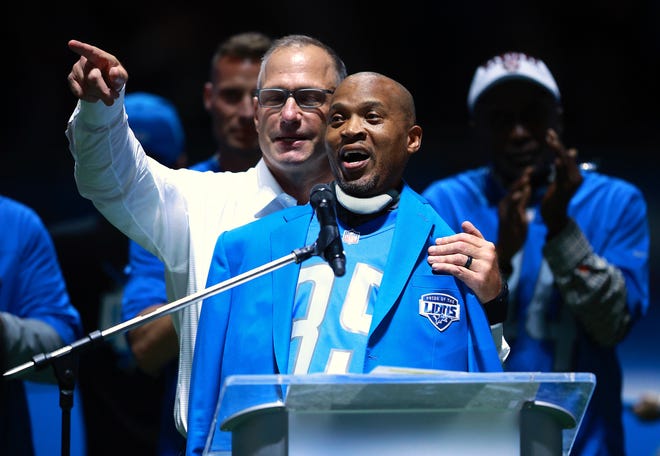
Former Detroit Lions safety William White died July 28 after a six-year battle with amyotrophic lateral sclerosis (ALS).
White, 56, played six seasons in Detroit after being drafted in the fourth round of the 1988 NFL draft out of Ohio State. White also spent three seasons with the Kansas City Chiefs and two with the Atlanta Falcons
Hugh McElhenny

NFL Hall of Famer Hugh McElhenny, an elusive running back from the 1950s died June 17. He was 93.
Elected to the Pro Football Hall of Fame in 1970, McElhenny’s thrilling runs and all-around skills as a runner, receiver and kick returner made him one of the NFL’s top players of the 1950s. He was the league’s Rookie of the Year in 1952 (before the award became official) and made two All-Pro teams, six Pro Bowls and the NFL’s All-Decade squad of the 1950s. McElhinney ended his NFL career with eight games with the Detroit Lions in 1964, in which he rushed 22 times for 48 yards.

Al Glick, who started a small business and became one of the biggest donors for University of Michigan athletics, died Feb. 8 at the age of 95.
Glick, the chairman and CEO of Alro Steel, based in Jackson, has his name on the Michigan football indoor practice facility. The Al Glick Field House opened in 2009 thanks to a $8.7 million donation from the businessman.
Glick also donated $3 million in 2011 for renovations to Schembechler Hall, the football team’s office building. The Ann Arbor campus also has the Glick Family Performance Center. Glick also donated the money to name a section of Mott Children’s Hospital in Ann Arbor the Coach Carr Pediatric Cancer Unit in 2011.

Roy Levy Williams, a prominent figure in Detroit and Michigan government who also served as an auto executive and as president of the Detroit Urban League, died Feb 11. He was 83.
Williams worked for three governors — William Milliken, James Blanchard and John Engler. In state government, he served as a director of urban affairs and also handled many education-related issues.

Yolanda Nichelle Curry, a Detroit artist known for her Olde English D signature earrings, died Nov. 1 at 45 years old after fighting cancer twice.
Diane Postler-Slattery

MyMichigan Health President and CEO Diane Postler-Slattery and her husband, Donald Slattery, died in a fatal plane crash in northwest Florida on March 8.
Postler-Slattery first came to Michigan in January 2013, when she became president and CEO of MyMichigan Health. Before that, she was president and chief operating officer of Aspirus Wausau Hospital and senior vice president of quality and extended services for the Aspirus system.

Raymond Wong, an immigrant from Hong Kong, changed palates on both sides of the Detroit River when he opened his restaurant in the late 1970s. He brought new spices, he brought dim sum, and he brought a breeze and swagger that made the proprietor as well-known as the cuisine. He died Aug. 22 at 73 years old.
His first enterprise was a tiny shop called Asian Gift Store that evolved into more of a Chinese grocery. He and a partner opened a restaurant called Yummy House, and then he launched Wong’s Eatery in Windsor. As the restaurant expanded, so did his ambitions, opening several more business, often with partners.
Living simply in his last decade, he shared a townhouse near Wayne State University with his longtime beloved, Eileen Bobrycki, a chef herself who had sparked his interest with a spinach feta pizza.

George Cvetanovski, owner of Hamtramck’s 7 Brothers Bar, died Feb. 2 at 90.
The bar on Jos. Campau — named for him and his six brothers — was a special site for a generation or so of Planet Ant and Second City Detroit troupe members, along with performers from theater groups all over the city and suburbs.
With walls covered by headshots of actors, posters for shows and theater programs, it was a neighborhood bar that morphed into a theatrical watering hole.

J.J. Barnes, a Detroit native R&B singer who scored a hit single in 1967 with “Baby Please Come Back Home,” died Dec. 10. He was 79.
Born James Jay Barnes in Detroit, he signed with Detroit-based Ric-Tic Records. Later in his career, he signed with Motown Records as a songwriter, but not as a recording artist.
In the ’70s, Barnes became a hit in the UK and was a face in the country’s northern soul scene.

Christina “Chris” Kucharski, a Cass Technical High School graduate who worked in the Detroit Free Press newsroom for more than 30 years as a researcher, writer and news archivist, died July 2 in Rochester Hills. She was 71.
Gene Guidi who spent 3½ decades providing sports coverage for the Detroit Free Press and helped readers solve problems through the ground-breaking Action Line column in the 1970s, died at 79 on Sept. 3
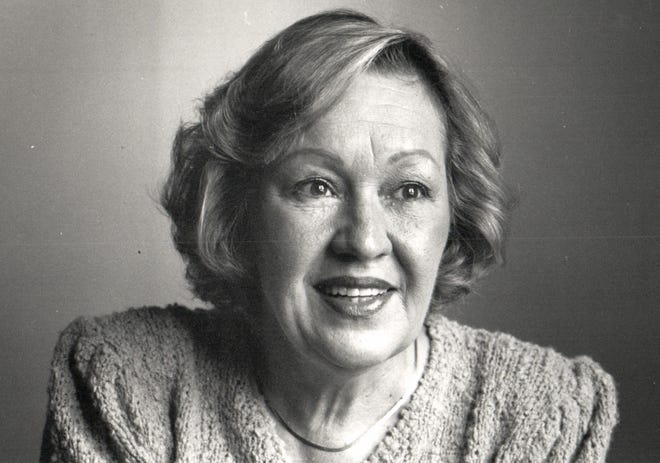
Longtime columnist Nickie McWhirter, 92, described as a “Swiss Army knife” to the Free Press, as she worked at the city desk, in the lifestyle section, covered advertisements in the business department and more, died May 16 at Sunrise Assisted Living in Troy.
Brendel Hightower is an assistant editor at the Detroit Free Press. Contact her at [email protected].








